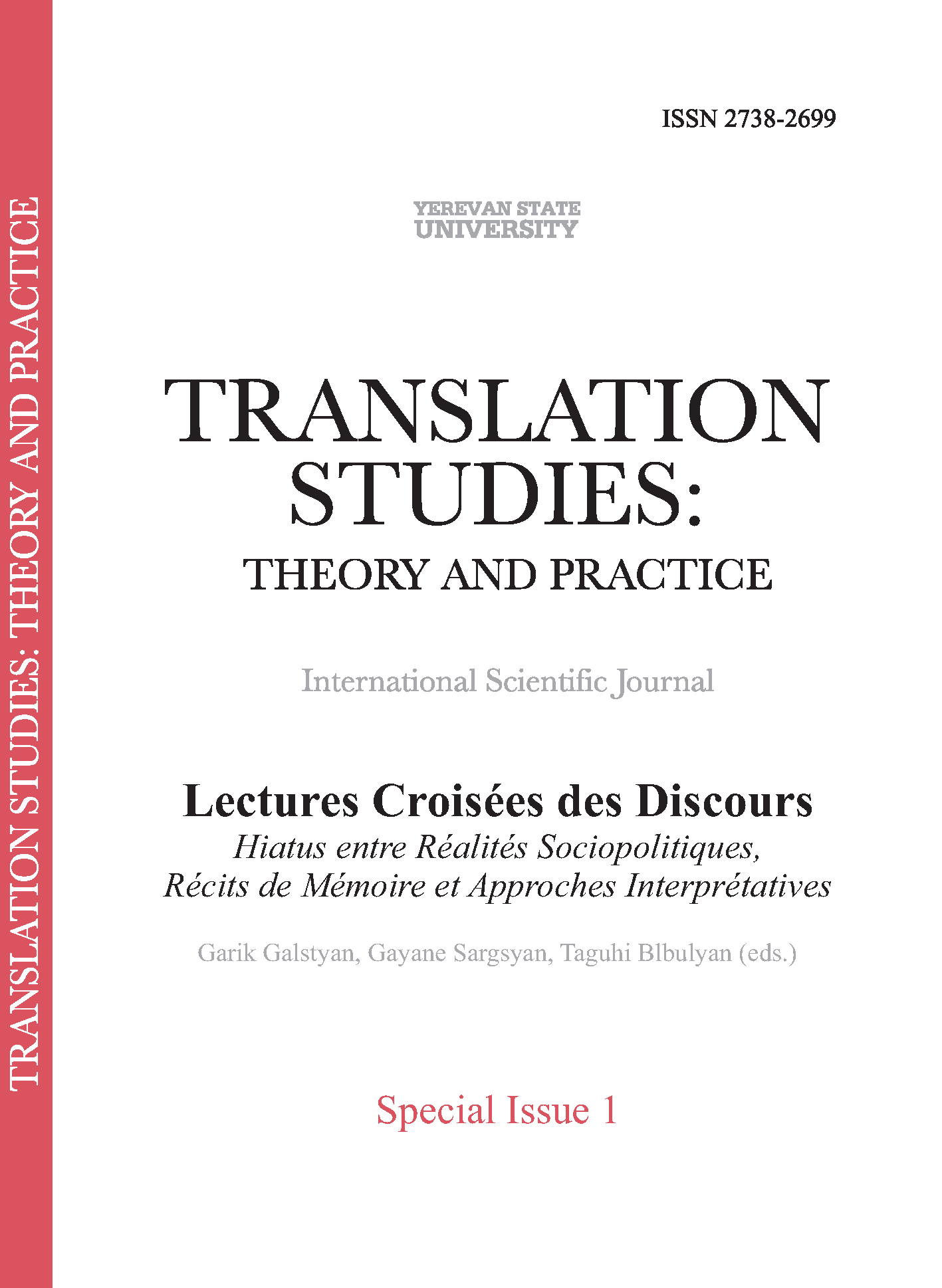The Lark Farm or How to Tell the Armenian Genocide: From the Novel (2004) by Antonia Arslan to the Cinematographic Realization (2007) of the Taviani Brothers
DOI:
https://doi.org/10.46991/TSTP/2023.SI.1.149Keywords:
Armenia, Armenian Identity, Antonia Arslan, Genocide, Taviani BrothersAbstract
The Lark Farm (2004) by Antonia Arslan, an Italian author of Armenian origin, was both a bestseller and a highly valued literary piece for Italians. Retracing the events of 1915, in Anatolia, the novel tells the story of the writer's family, between Italy and her native country, at a fateful moment in history. The uncle in the romantic fiction was in fact the grandfather of the author-narrator, hence the work of memory recovery of the history of his family on the part of Arslan, which leads to the denunciation of the Armenian genocide. Following the phenomenal success of the book, the filmmakers Paolo and Vittorio Taviani also looked into the question of the Armenian genocide and produced their cinematographic work in 2007. While remaining very close to the romantic fiction of Arslan, they have, however, introduced several new elements in the filmic narration by using the melodramatic model as a watermark of their aesthetic discourse.
References
« AlloCiné », « Anecdotes du film Le Mas des Alouettes », p. 1-3. URL : www.allocine.fr/film/fichefilm-112122/secrets-tournage/ (consulté le 10 août 2022).
Alù, Giorgia, « Sulle tracce del passato : memoria e frammentazione familiare in Vita di Melania Mazzucco e La Masseria delle Allodole di Antonia Arslan », in Tempo e memoria nella lingua e nella letteratura italiana, vol. III: Narrativa del Novecento e degli anni Duemila, Atti del XVII Congresso A.I.P.I., Ascoli Piceno, 22-26 agosto 2006, Civiltà italiana, Nuova serie 5, 2009, p. 363-374.
Arslan, Antonia, La masseria delle allodole, Rizzoli, Milan, 2004.
Arslan, Antonia, Le mas des alouettes. Il était une fois en Arménie, traduit de l’italien par Nathalie Bauer, Robert Laffont, collection POINTS, Paris, 2006.
Arslan, Antonia et Pisanello, Laura, Hushèr. La memoria. Voci italiane di sopravvissuti armeni, Guerini e Associati, Milan, 2001.
Cuccu, Lorenzo, « Dalla “storia” alla “rappresentazione” : La masseria delle allodole di Paolo e Vittorio Taviani», in Taviani, Paolo et Vittorio, La masseria delle allodole, Lorenzo Cuccu et Andrea Mancini (dir.), foto di scena di Umberto Montiroli, Titivillus, Pise, 2008, p. 5-16.
Dadrian, Vahakn, Storia del genocidio armeno. Conflitti nazionali dai Balcani al Caucaso, Guerini e Associati, Milano, 2003.
Dédéyan, Gérard, Storia degli Armeni, Guerini e Associati, Milano, 2007.
Garna, Stefania, « Intervista ad Antonia Arslan. La Masseria delle Allodole : storie e storia al femminile, in DEP : Deportate, Esuli, Profughe. Rivista telematica di studi sulla memoria femminile, Padoue, 2 (2005), p. 147-152. URL: https://www.unive.it/pag/fileadmin/user_upload/dipartimenti/DSLCC/documenti/DEP/ numeri/n2/10-Intervista_Arslan.pdf (consulté le 10 août 2022).
Jansen, Monica, « Memoria e armenità ne La Masseria delle Allodole di Antonia Arslan », in Tempo e memoria nella lingua e nella letteratura italiana, vol. III: Narrativa del Novecento e degli anni Duemila, Atti del XVII Congresso A.I.P.I., Ascoli Piceno, 22-26 agosto 2006, Civiltà italiana, Nuova serie 5 – 2009, p. 437-448.
« Le Mas des Alouettes », ZOOM n° 32 – Mai-Juin 2007, https://www.grandecran.fr/lido.fichier/pdf/Zoom32.pdf (consulté le 09 août 2022).
“Lirics Translate”, « Ով Սիրուն, Սիրուն » [Oh ma beauté]. URL: https://lyricstranslate.com/fr/beauty-beauty-lyrics.html (consulté le 08 août 2022).
Mutafian, Claude, Metz Yeghèrn, Breve storia del genocidio degli Armeni, Guerini e Associati, Milano, 1995.
Ongaro, Laura, La Diaspora Armena in Italia, Tesi di Laurea, Università Ca’ Foscari, Venise, a. a. 2015-2016, sous la direction de M. le Professeur Aldo Ferrari, tapuscrit.
Orabona, Francesca (dir.), L’immaginazione melodrammatica secondo Peter Brooks. Per una costante della visione estetica nei tempi moderni, CUEM, Milan, 2004.
Pisanello, Giorgio, Introduction, in Arslan, Antonia et Pisanello, Laura, Hushèr. La memoria. Voci italiane di sopravvissuti armeni, Guerini e Associati, Milan, 2001.
Taviani, Paolo et Vittorio, La masseria delle allodole, Lorenzo Cuccu et Andrea Mancini (dir.), foto di scena di Umberto Montiroli, Titivillus, 2008, Pise ; La masseria delle allodole, 2007, DVD, RAI CINEMA S.P.A., B0013V4KYM.
“Treccani”, « Taviani, Vittorio ». URL: https://www.treccani.it/enciclopedia/vittorio-taviani_%28Dizionario-Biografico%29/ (consulté le 11 août 2022).
Downloads
Published
How to Cite
Issue
Section
License
Copyright (c) 2023 Walter Zidarič

This work is licensed under a Creative Commons Attribution-NonCommercial 4.0 International License.










